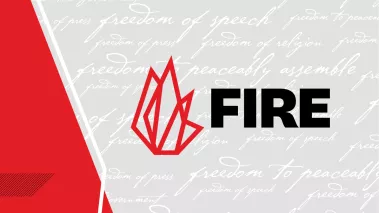Table of Contents
FIRE statement on campus violence and arrests

FIRE is monitoring outbreaks of violence and arrests on campuses nationwide. Sadly, we must again restate a bedrock principle: Violence is never acceptable.
Colleges and universities must ensure the swift arrest of anyone engaging in violence on campus, whether committed by students or visitors. Violence thus far appears to have been isolated, but things can change at any moment, and it must be made clear that any violence is unacceptable. Institutions must provide meaningful security and take prompt action to separate groups when tensions flare. For everyone’s safety, and to secure expressive rights for all, no one on campus should have any sense whatsoever that violence will be tolerated or excused.
While the First Amendment protects a great deal of expression, FIRE again emphasizes it is not without boundaries. True threats and incitement to violence, as defined by the Supreme Court, are not protected. Neither is discriminatory harassment: targeted conduct that is so severe, pervasive, and objectively offensive that it denies the targeted student access to an educational opportunity or benefit. And when protesters surround opposing speakers or otherwise prevent students from freely moving around campus, they cross the line separating protected expression and unprotected misconduct.
By acting decisively to defend protected speech while preventing violence, colleges and universities can preserve the safety and stability required for the discussion across differences they are uniquely equipped to facilitate.
Peaceful protest is generally protected, and colleges and universities must ensure students can engage in peaceful protest on campus. But we remind students that engaging in civil disobedience may result in punishment, including arrest. Civil disobedience derives its expressive power from the willingness of participants to accept the consequences of breaking the rules. That willingness illustrates their intensity of feeling. Students occupying campus spaces in violation of reasonable, content-neutral rules risk punishment. When that punishment is viewpoint-neutral, proportional, and in keeping with past practice, it does not violate expressive rights.
We likewise remind administrators and law enforcement that institutional responses must be measured. Peaceful protest must not be met with violence simply because of the viewpoints expressed.
This is an extraordinarily difficult moment for students, faculty, administrators, alumni, and the public. Tensions are high and nerves are raw. The charity and grace necessary for productive dialogue are in vanishingly short supply, and it can be difficult to separate protected expression from its opposite.
Amidst this intense pressure, our nation’s institutions of higher education must lead the way. By acting decisively to defend protected speech while preventing violence, colleges and universities can preserve the safety and stability required for the discussion across differences they are uniquely equipped to facilitate.
Recent Articles
Get the latest free speech news and analysis from FIRE.

FIRE's 2025 impact in court, on campus, and in our culture

The trouble with banning Fizz

VICTORY: Court vindicates professor investigated for parodying university’s ‘land acknowledgment’ on syllabus


